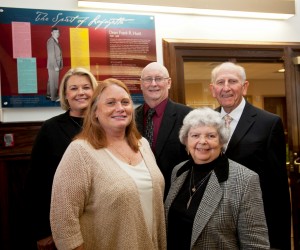During finals at the end of Floyd Johnson’s junior year in 1948, his mother had a serious accident so he had to go to Pittsburgh to see her.
“When I returned, I heard a knock on my door,” says Johnson. “It was Dean Hunt. He wanted to find out if I had missed any finals and that he would look into it for me. I didn’t need his help because I had managed to take all of my exams.”

Frank Hunt’s grandchildren – Sara Lewis, Ruthanne Lewis Turcotte, and Larry Lewis – with Sandye Turnauer and Jerry Turnauer ’59 in front of the plaque dedicated to Dean Hunt in Hogg Hall
But near the end of senior year, Johnson, who was attending college on the G.I. Bill after serving in the Army Air Corps and working for his meals in fraternity house kitchens, found out that his stipend had ended.
“I went to Dean Hunt,” he says. “He asked me what I would need to get through the end of the year. I said $100. He told me to go down to the treasurer’s office, and it would be there. I graduated a month later, hitching a ride home, knowing I had a friend at school.”
Johnson’s experience of the guidance and counsel of Frank R. Hunt, who was dean of students from 1946 to 1958, is echoed by numerous other students from that era. Many of them also contributed to the fund initiated by Jerry Turnauer ’59 to establish the Dean Frank R. Hunt Emergency Scholarship to honor him and perpetuate his selfless acts of kindness. The many stories of how he enabled students to complete their degrees despite financial, academic, social, or personal obstacles have only come to light in recent years. Turnauer also funded a memorial plaque for Hunt, now on display in the lobby of Hogg Hall.
Sigmund S. Semon ’59 arrived at Lafayette planning to become an engineer. After a semester of struggling through mathematics, chemistry, and engineering drawing, he decided it was time to drop out and called his parents to come pick him up.
“Dean Hunt persuaded me to stay and switch my major to history,” he recalls. “It was going to be a real challenge because I would have to take 18 to 21 credits each year to make up for the lost engineering credits, and I would have to maintain an 80 average…I more than maintained that average, graduated with honors, and went on to Cornell law school. It would never have been possible without the encouragement and advice of Dean Hunt.”
Hunt assisted David Moore ’53, who arrived at Lafayette after his military service, in getting settled in Vets Village on March Field for married students and in finding a job for his wife.
“He had a patient manner and listened carefully; he could point you toward a more productive path with just a few words,” says Moore. “He made a big difference for students facing major turning points.”
For George Werner ’59, being able to stay enrolled at Lafayette meant working part-time jobs. In December of his freshman year, the U.S. Postal Service offered him several weeks of work in New York City during the holiday rush.
“Dean Hunt listened patiently and then said it would and could not be possible, especially for a first-year student, then gave me permission to go,” he says.
For the next three years, Werner delivered the mail twice a day and once on Sunday in the Borough of Queens during December.
“Dean Hunt was tough, but he was kind, and he was very wise,” he says.
When Lem Howell ’58 attended Lafayette he was one of only 19 black students on campus. Dean Hunt and his wife invited them to their home on Sunday mornings for breakfast to make sure all was going well and to give them a sense of home.
“Dean Hunt was a genuinely nice man who understood how to make things better for us on campus,” says Howell.
The Hunts also hosted events for international students at their home.
Ray Jacoby ’57 recalls, “Dean Hunt was faculty adviser for the Cosmopolitan Club, which later became the International Student Association. The members were international and domestic students who wanted to share their country’s cultures with each other.”
In those days, attendance at Convocation was required. Students handed in cards imprinted with their name as proof. Glenn Grube ’57, who was living at home in Phillipsburg, found the card in his pocket that night but just put it in a file on his desk. In January, he received a letter from Dean Hunt saying that it would be difficult to give him a recommendation in the future because of his failure to follow directions and that it was going to be on his permanent record. Grube went to see him right away.
“I began a lengthy explanation of my presence including sharing detailed exchanges that occurred,” he says. “Dean Hunt stopped me and said ‘Glenn, you do not have to go further. You told me you were there. I trust you to tell me the truth. The letter is destroyed.’ I used this approach throughout my 40-year career…I trust you to tell me the truth. I believe you!”
